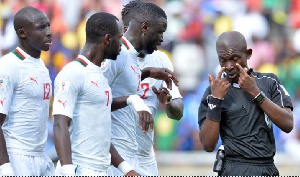FIFA's decision to replay the disputed World Cup qualifier between South Africa and Senegal has come as a bolt out of the blue to both countries, who just weeks ago were stridently offering differing views on the disputed tie.
But now that the matter has played out its judicial process, to replay the game is the only logical option and it will happen in November when South Africa are due to meet Senegal in Dakar anyways in the last game of the qualifying process for both countries.
Now there will be two matches in the matter of days in November's international window, presumably the replayed match in South Africa first before the game in Senegal, although FIFA will only pronounce on this next week.
World football's governing body kept a stubborn silence on the entire matter from the dramatic day in March when a brief statement announced that the man in charge of the match, Joseph Lamptey of Ghana, had been found to have manipulated the result of the November 12 match between South African and Senegal.
No details of the offence were offered, no comment made in answer to follow-up questions, and nothing said since ... not even to explain the process, despite repeated requests.
All the four-paragraph statement said was that the FIFA Disciplinary Committee had decided to ban Lamptey from "taking part in any kind of football-related activity (administrative, sports or any other) at national and international level for life" after he had been found guilty of unlawfully influencing the result of the game in Polokwane.
That is why Senegal were tearing out their hair in frustration over the lack of any answers to repeated requests to FIFA to find out whey their numerous demands for a replay were not being answered. They seemed resigned to having lost a chance for justice.
On the other hand, SAFA president Danny Jordaan was bellicose in his belief that FIFA would not order a replay even if the referee had cheated to ensure South Africa won the game, presumably at the behest of a betting syndicate. It would not be possible to order a replay for FIFA would then be "opening up can of worms and led to other efforts to get future games replayed", he insisted.
But while the two countries were kept in the dark -- a disturbing characteristic of the new FIFA regime -- it was a process where clues to the lengthy time it has taken to order a replay are now all too obvious.
Firstly in their original statement in March, announcing the original ban on Lamptey, FIFA said: "Further information concerning the South Africa v. Senegal match in question will be provided once the decision becomes final and binding."
It took so long between March and Wednesday's announcement of the replay because Lamptey tried to get his ban overturned, a process that was not publicised, but that the Court for Arbitration in Sport had down to hear on July 25 in its list of upcoming hearings which it published on its website just a week earlier. It was missed by the media.
FIFA has beaten CAS to revealing the ban was upheld but, hopefully, in time the entire judgement will be published and will provide some of the tawdry details of Lamptey's folly. His performance in Polokwane in November did raise immediate questions -- a shockingly soft penalty in favour of the hosts and then letting stand a goal scored from a quickly-taken free-kick even while the referee himself was distractedly dealing with the complaints of the Senegalese players.
And given that investigations then led to the discovery he was paid to do so, it is only right that the game is played over again. Patently if the referee cheated and ensured a contrived outcome, the game must be declared null and void. It is only logical.
There will finally be a sense of justice for the Senegalese, while South Africa are keeping their counsel but are likely to take the issue back to CAS.
A statement on Thursday said: "SAFA is studying the contents of the report and will issue a statement on intentions to challenge that decision. SAFA wishes to also state categorically that it was in no way involved with any wrongdoing related to the actions of the referee, as stated in the FIFA report."
Sports Features of Friday, 8 September 2017
Source: ghanasoccernet.com

















